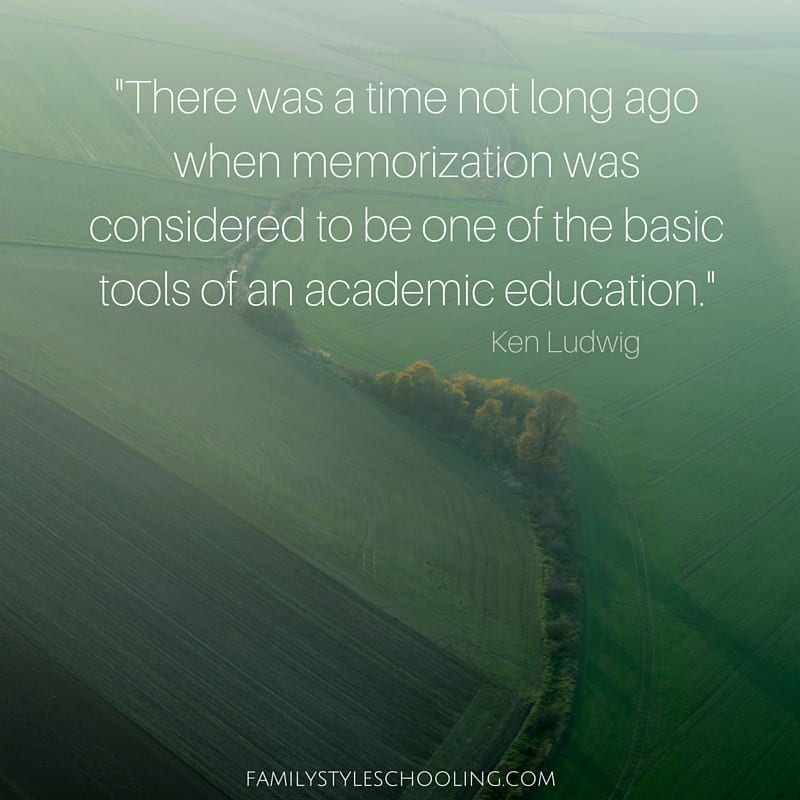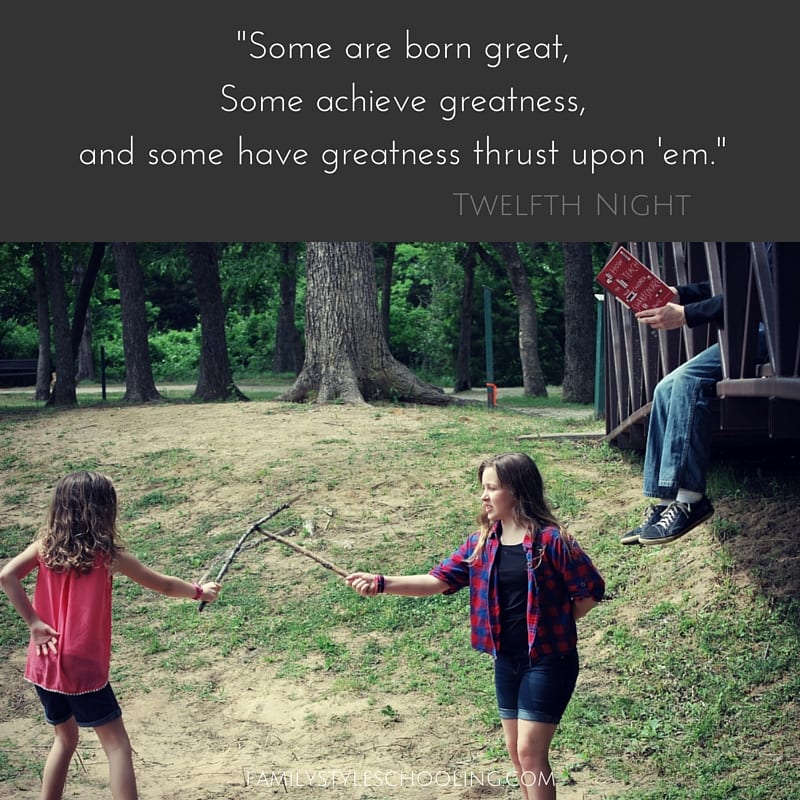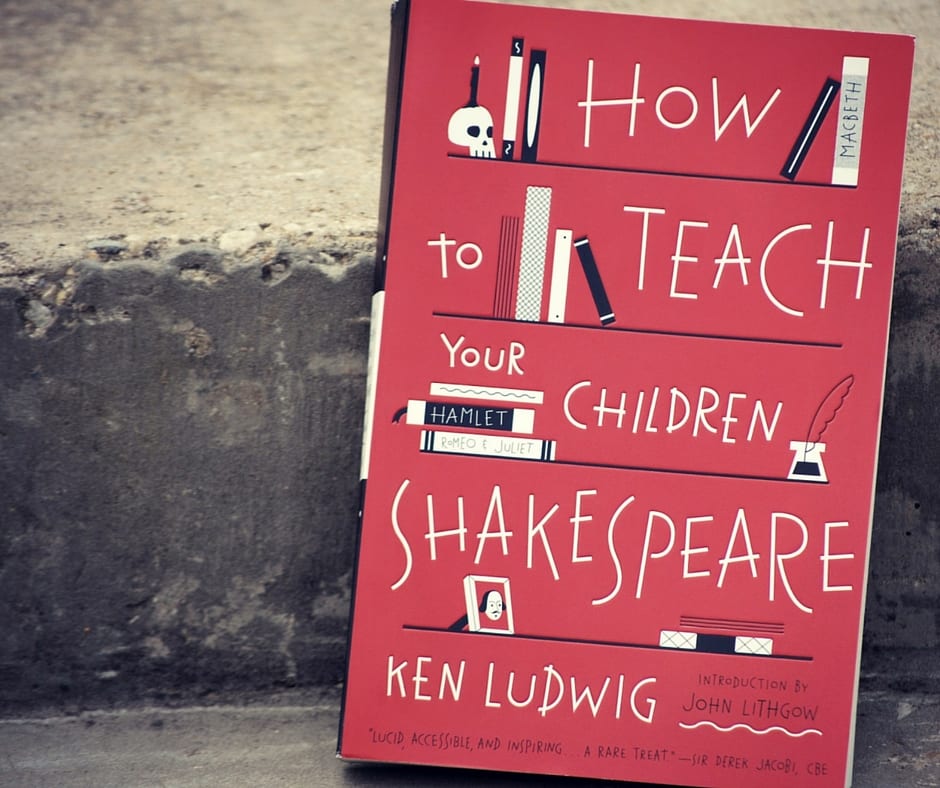Enriching Family Time with Shakespeare
Our morning time is a cherished part of our day. It's a family meal of sorts where we come together and spend quality time reading good books, discussing big ideas, and enjoying learning together. I'm amazed that a simple thing like connecting in the morning can be so enriching to our family life.
For the spring, I was looking for a change of pace from our Periodic Table study. When I saw How to Teach Your Children Shakespeare, I thought it would be the perfect spring addition to our morning time. Last semester, I read through Taming of the Shrew with my oldest, and we really enjoyed it. However, making Shakespeare approachable to my younger kids seemed like a daunting task. The challenge didn't hinder me because I like to do hard things, but when I started reading Ken Ludwig's book, my soul was stirred and I felt hope that I would be able to bring this study to life.

I received a free copy of the book and was compensated for my time in reviewing How to Teach Your Children Shakespeare. All my opinions are my own. This post may contain affiliate links. See my full disclosure policy for more details.
Memorizing Shakespeare
Ken Ludwig starts his kids' instruction with Shakespeare by helping them memorize passages from various plays. The beauty of his process is that it's not simply memorizing, but also understanding the words, phrases, and passages you're memorizing.
I used to look down on memorization. When I was in school, the only purpose of memorization was to study for a test and then forget everything I had just "learned." However, memorization does much more for the soul than I gave it credit for.

We memorize scripture, but a brain trained to retain can hold so much more!
Why Shakespeare?
Shakespeare had a mastery of language, and could express emotion that calls the heart to a deeper level of understanding of itself. He inspired so many writers that followed, therefore, if we'd like to understand those references, we'd better go back to building an understanding of Shakespeare, and lock it in our memories for easy reference.
Shakespeare, as the greatest artist in the history of our civilization, has worlds to teach us as long as we have the tools we need to understand him. - Ken Ludwig
Shakespeare for the Soul
Shakespeare can easily feel like a foreign language if you don't understand his vocabulary. Ludwig walks you through the passages line by line and brings the passages to life. The greater your understanding of Shakespeare's works, the richer your enjoyment will be. Too bad Ken Ludwig doesn't have a full book for each of Shakespeare's plays! However, How to Teach Your Children Shakespeare is a great place to start, and as you become more comfortable with delving into deeper understandings of the meanings behind the words, you'll feel equipped to research more on your own.



Teach Your Children Shakespeare
As with any difficult subject, the goal in presenting it to our children is not to assume they'll master it, but to introduce them to it in such a way that they will grow to love it and desire to master it when their faculties are mature. Here are some ways to bring Shakespeare to life:
1. Get Familiar with the Story
There are many great resources out there that help you familiarize yourself and your children with Shakespeare's stories.
Charles and Mary Lamb have a wonderful collection of Tales From Shakespeare that bring the stories to life, and offer a great introduction to the characters, setting, and plot of the great plays. Once you know the basics, you are much more free to start mining the depths.
Shakespeare: The Animated Tales - think puppets/claymation and the Bard. So fun!
Brick Shakespeare: Four Tragedies and Four Comedies - Lego bricks combined with Shakespeare plays comic book style.
Illustrated Stories from Shakespeare - a simplified selection of Shakespeare's works by Usborne.
2. Get Familiar with the Time Period
Just like when you read the Bible, you need to know the context in order to truly grasp the meaning, familiarizing yourself with Shakespeare's time period will help you gain deeper insight into the metaphors and imagery used.
The Oxford Companion to Shakespeare is one of the best all around resources for digging into the time period of the pieces.
In Search of Shakespeare is a BBC produced documentary that brings you into the life and times of the Bard.
Shakespeare A to Z: The Essential Reference to His Plays, His Poems, His Life and Times, and More
Shakespeare for Kids: His Life and Times, 21 Activities for Kids brings the Shakespearean culture to life with juggling, sword play, word coining, and much more.
A Shakespearean Theater (A Visual Guide) is a beautifully illustrated tour of the theater that takes you behind the scenes of Elizabethan London.
3. Soak in the Beauty of the Language
The best way to teach your children Shakespeare is to fall in love with it yourself. If you did not study English in college, understanding the deeper meanings behind the themes and images might be harder to see without a guide. Here are some great resources for drawing out meaning:

connecting the two classic works of life and history - The Bible and Shakespeare.
Shakespeare's Imagery and What it Tells Us is an invaluable tool for gaining insight to deeper understanding of the Shakespearean language.
Since Shakespeare's works were made to be heard and not just read, make sure to include listening or watching them through audible recordings, movies, or live performances. They only get better the more you become familiar with them. As your enjoyment increases, your desire to share your love will overflow into the lives of your children.
Where to Begin to Teach Your Children Shakespeare
The easiest place to begin is getting your hands on a copy of Ken Ludwig's book: How to Teach your Children Shakespeare. It is such a rich resource to get you started. He includes printable forms of the passages you're memorizing as well as links to audio files to help with pronunciation.

Ken Ludwig is giving away 10 copies of his book, and will ship anywhere in the world. Enter the giveaway below to have a chance at getting your copy for free.
Follow Ken Ludwig on social media to keep up to date on great ideas for cultivating a love of Shakespeare, as well as engaging with a community of people who are also seeking to enrich their family time with his works.
Follow Ken Ludwig on Facebook | Twitter
What are your favorite resources you use to teach your children Shakespeare?
Betsy Strauss is an unexpected homeschooler, mother of three, who is in a relationship with a sweet man for life. She loves reading books, drinking coffee, and learning anything with her kids.




This is so fabulous! We can testify to the rich resource that Ludwig’s book truly is.
We live abroad, but when I read a review of this book two years ago or so I knew we had to have it immediately and downloaded it straight away to my book reader. My then 5 and 7 year old daughters took to it immediately (they attend Chinese day school, so memorization – recited in front of 35 peers – is a daily occurrence). We all learned so much and we have gone through four of the plays thus far. We quote Shakes regularly in our daily lives, thanks to Ludwig’s efforts. Doesn’t hurt that one of our children is named Olivia…the Twelfth Night is obviously a real favorite. Who doesn’t want to hear their name hallooed to the reverberate hills?
Thank you for the list of other resources. Definitely interested in several, especially the Brightest Invention in Heaven and the Oxford Companion. We also used the Shakespeare Can Be Fun series by Lois Burdett and listened to the Lamb audio you mentioned. Several Shakespeare biographies were interesting, particularly the Who Was series on the Bard. I made a large list of Shakespeare’s plays in the shape of a book cover for the fridge. We studied these, but haven’t fully memorized. The girls placed black, white or red flags by each play to indicate if it was a tragedy, comedy or history theme – like at the Globe Theater. Noting the correlation between Shakespeare’s life events and the genre of his plays.
Really enjoy your blog, Betsy. You are extremely talented and your designed teaching tools and recommendations are what keep me checking this site!
Thanks Dee Dee! I love hearing that your family is really enjoying the book. What a great idea to identify the different types of plays with flags. I love that! I need to look into the Shakespeare Can Be Fun series. That sounds great. Thanks for sharing your experience!
I entered, but I haven’t seen an announcement with the winners. Is it posted somewhere?
I was not in charge of the giveaway, but only helping host it. I’ll check on that and get back to you!
You can see the winners now! Thanks for entering.
Thank you!